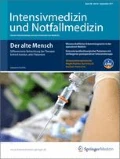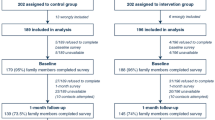Summary
In a research project physicians of intensive care units documented their conversations with relatives of patients who died of brain death. 131 case documentations (each two pages of a standardized questionnaire made anonymous) provided the basis of the evaluation presented here. Data was largely collected from hospitals of maximum care. 65% of the patients’ relatives finally consented to organ donation, whereas 35% rejected it. In 31% of the cases the communication with the relatives started early on (i. e. immediately after the diagnostic process of brain death was initiated), at a time when the request for donation was not yet made, whereas communication with 44% of the relatives commenced at the end of the procedure. In approximately 3/4 of the cases an oral or written consent to organ donation from the deceased was not available. Women more often than men were the final decision-makers, the mean age was 55 years. Main motives for agreement were altruism, empathy and a search for meaning. Main rejection motives were notions related to a “violation of body integrity” and an inability to accept the death of the beloved one.
Zusammenfassung
Im Rahmen eines Forschungsprojekts dokumentierten Ärzte ihre Gespräche mit den Angehörigen plötzlich im Hirntod Verstorbener anonym in einem standardisierten zweiseitigen Fragebogen, so dass für die vorliegende wissenschaftliche Auswertung 131 dokumentierte „Fälle“ zur Verfügung standen. Dabei waren überwiegend Häuser der Maximalversorgung einbezogen, in 65% der Fälle hatten die Angehörigen abschließend einer Spende zugestimmt, in 35% diese abgelehnt. Die Gespräche über eine Organspende mit den Angehörigen beginnen z.T. früh (ohne bereits eine Entscheidung zu verlangen), in 31% der Fälle wurden sie bei Einleitung der Hirntoddiagnostik aufgenommen, in 44% nach deren Abschluss. In 3/4 der Fälle lag keine klare schriftliche oder mündliche Willenserklärung des Verstorben zur Frage einer Organspende vor. Träger der abschließenden Entscheidung waren häufiger Frauen als Männer, das Durchschnittsalter lag bei 55 Jahren. Hauptmotive einer Zustimmung waren Altruismus, Mitgefühl und Sinngebung, Haupt-Ablehnungsgründe Probleme mit der Verletzung der körperlichen Integrität und ein Nicht-akzeptieren-Können des Todes.
Similar content being viewed by others
Author information
Authors and Affiliations
Additional information
Serie: Intensivmedizin und Management bei Organspende und Transplantation Herausgegeben von D. Maurer und D. Gabel (Neu-Isenburg)
* Voller Titel der Studie: ‚Das Gespräch mit den Angehörigen plötzlich Verstorbener und die Bitte um Organspende—Ergebnisse aus Sicht der gesprächsführenden Ärzte‘
Rights and permissions
About this article
Cite this article
Muthny, F.A., Smit, H. & Molzahn, M. Das Gespräch mit den Angehörigen plötzlich Verstorbener und die Bitte um Organspende*. Intensivmed 41, 255–262 (2004). https://doi.org/10.1007/s00390-004-0490-8
Received:
Accepted:
Issue Date:
DOI: https://doi.org/10.1007/s00390-004-0490-8




